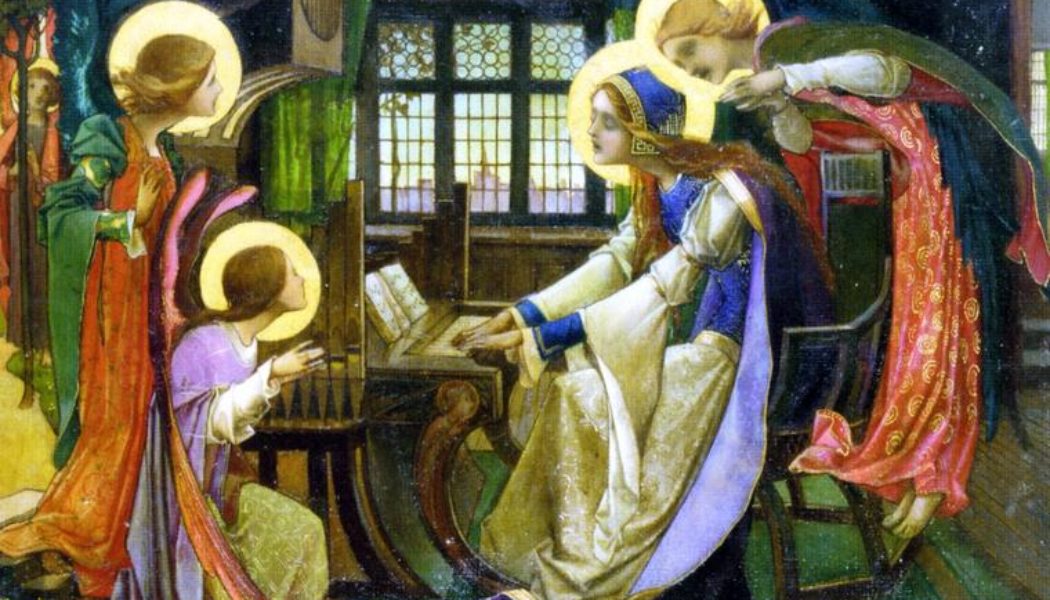
St. Cecilia’s story is a breathtaking tale of heroism and romance that models the life of a young woman lost in love for Christ.
“Why can’t women become priests?”
It’s a question I am asked constantly by the young women with whom I work in my nonprofit. Most of the time it is not phrased combatively. They simply want to know, and most likely no one has ever explained it to them outside of simply “that’s the way Jesus did it.” Not an incorrect explanation, but also not satisfying for these girls, told by the world since birth that women belong in every role a man can have.
So, I utter a quick prayer to the Holy Spirit to grant me the right words, and I explain as faithfully as I can the role of the sacramental priesthood. Christ established the priesthood of the Church and we cannot alter it. I assure them that the lack of females in the apostolic succession was not a fluke. Jesus was not catering to the social norms of the time when he invited only men to the priesthood. The Creator of the Universe was not squeamish about asking women because he was attempting to be politically correct. Like everything else Christ did on earth, there was intentionality behind this decision. I explain, to the best of my ability, about gender complementarity, the feminine genius, the feminine nature of the Church, the Bride of Christ, and the masculine nature of the priesthood.
Once they understand that banning female ordination is not a sexist quirk in the Church, then we can tackle the next question: What is the proper role for women in the Church? Thankfully, this question is much easier, and there are hundreds of female saints whose lives I can point to, all of whom placed their lives in service to Christ and his Church.
St. Cecilia is one of these women. We remember her today as the patroness of musicians and we hear her name invoked at Mass, listed among the martyrs. Her story is a breathtaking tale of heroism and romance that models the life of a young woman lost in love for Christ.
The daughter of affluent Christians in third-century Rome, Cecilia pledged herself to God from a young age, taking an oath of perpetual virginity. When her parents later arranged a marriage for her to a young pagan man, Valerianus. She dutifully obeyed her parents, trusting that God would open the heart of her husband. Throughout her wedding, she is said to have poured out a song to God in her heart, earning her status as the patroness of musicians. That night, she explained the nature of her oath to her very kind and understandably baffled new husband.
He, rather impressively, took the news of his bride’s sworn virginity in stride. Determined to understand Cecilia’s faith he sought out Pope Urban I, then living in hiding to escape persecution, and was baptized. His brother, moved by their witness, converted as well. The three of them became leaders in the early Church community in Rome. Cecilia preached and evangelized constantly, bringing hundreds of people to the Pope for baptism. Her husband and his brother braved the dangerous streets of Rome to find the bodies of executed Christians and bury them. During one of these missions of mercy they were discovered by the authorities and martyred. Before their deaths, their would-be executioner, Maximus, converted to the faith and was martyred alongside them.
Widowed and heartbroken, Cecilia carried on in her mission to spread the Gospel and bring the Roman pagans to Christ. She opened her home to priests to celebrate Mass in secret, and she poured herself into charity and service to the poor. Reports of her life attribute nearly four hundred conversions to Cecilia. Disturbed by this woman’s effective efforts for the Church, the Roman prefect Almachius ordered his soldiers to lock her in her own bath to die from the heat, lest a public execution incite too much sympathy. The steam did not harm Cecilia, and the soldiers resorted to beheading, striking her three times on the neck. Miraculously, the blows did not kill her, though they injured her fatally. The soldiers fled, leaving her to die on her floor.
For three days, Cecilia survived. Her friends gathered around her and she prayed with them, opening her home up once more for the crowds that flocked to her side, asking to learn more about Christ from the dying woman. Even as she bled out, Cecilia offered up her tremendous pain for their souls and encouraged them in their faith. Despite the gruesome death she was suffering, Cecilia remained joyful and filled with hope into her final moments.
Like all saints, Cecilia’s sanctity came not from the incredible works she achieved but because of how close she kept to Christ. She did not seek fame, nor did she desire followers. She simply loved Jesus and wanted others to love him too. She knew the truth of her faith and filled with love, she wanted to share that truth so she could bring as many with her to heaven as she could. She could not administer sacraments, but she could tell others about the Gospel, bring them to be baptized, and shelter priests.
Most critically, Cecilia understood that her greatest calling was to place everything she had in service to Christ. She knew to whom she belonged, and she gave him everything. Her heart was his, and thus all who met her were gently led to God. First her husband, then his brother, and hundreds of others. Her wealth she gave to Christ’s poor and to his Church. Her talents as a speaker and as a community organizer were used for his glory. Finally her life, she gave up for him.
The world tells us to value positions and titles, and to feel wronged when we do not receive what we feel we are owed. St. Cecilia, and the many holy men and women who came before and after her, knew better. She did not ask what opportunities the Church could offer her. She asked God how she could serve his Church, and she poured out her very life answering his call.
St. Cecilia, pray for us!









